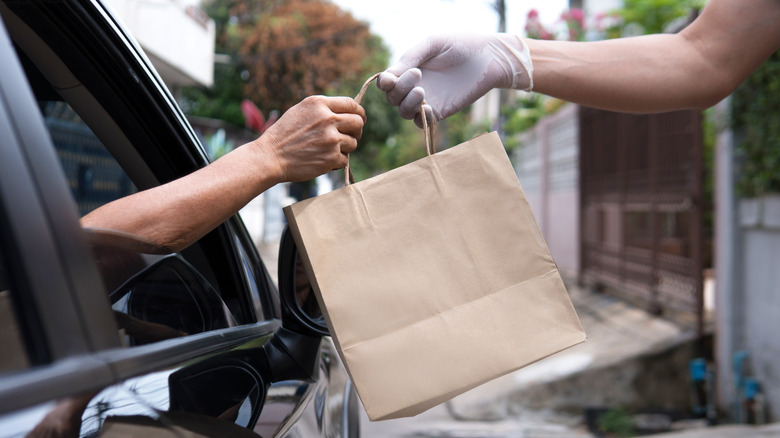The Crucial Drive-Thru Etiquette To Remember On Rainy Days
Once upon a time, restaurant etiquette was almost exclusively concerned with fine dining, and as long as one could properly identify an oyster fork and handle a napkin with aplomb, good manners were ensured. But as new technologies have increasingly made our lives easier, they've also introduced new definitions and dimensions of what constitutes proper restaurant etiquette.
Emily Post, the long-time (and long ago) arbiter of good manners in America, likely never conceived of a world where drive-thru service would be the subject of a treatise on restaurant etiquette. But as bad manners are now rife in regard to this convenience-oriented restaurant experience, more attention is certainly merited. How many know, for example, that on rainy days one should always turn their windshield wipers off when receiving food at a drive-thru?
The reason is commonsensical, of course. Your windshield wipers are likely to splash water onto the hard-working server who is handling your order. It's rude, and a rather poor way to treat someone who is handing you delicious food. But in reality, it's only the tip of the proverbial iceberg in terms of the etiquette missteps common among those indulging in one of the simplest of all restaurant exchanges.
How to be respectful when ordering at a drive-thru
When dining in at a restaurant, etiquette is in large part aimed at being respectful towards one's host and fellow guests. Naturally, one should also be respectful toward service staff as well. The drive-thru experience differs in terms of the way food is ordered and delivered, but the fundamental tenet of respect still applies. In fact, virtually all drive-thru etiquette rules are based on the idea of being respectful to those taking and filling your order, and those who are waiting in line behind you.
In the case of the drive-thru experience, this should ostensibly be easy, since if one is quick, clear, and concise while giving their order, it not only makes the job easier for fast food or fast casual employees, it also ensures a shorter wait for others.
Anticipation is also key, as it helps to expedite the process. If you already have money ready, for instance, you won't have to hold up the line while you rummage around in your purse, wallet, or car console for exact change. This sort of anticipation is likewise appreciated by employees, especially when it comes to common courtesies. The latter includes turning off your headlights during nighttime visits so you don't shine bright lights in their eyes, or turning off windshield wipers before you pull up to the window on rainy nights, so that you don't repeatedly get them wet with an unwanted spray of water.
Good manners facilitate friendly and fast service
As drive-thru lanes surge in popularity, good manners are becoming increasingly important, at least among those who value convenience and fast service. Although certain rules — like turning off headlights at night, or windshield wipers on rainy days — apply only in certain circumstances, others should be used at all times to keep lines moving swiftly.
Most drive-thru etiquette rules revolve around the mechanics of ordering. For instance, if you're visiting a restaurant you're very familiar with, there's no reason you (and anyone else in your car) shouldn't already know what you want to order by the time you pull up to do so. Placing orders clearly and with no interruptions or intrusions — from noisy passengers to simultaneous phone conversations and loud radios — ensures you get your food faster, and so does everyone else.
Interestingly, a recent study from Intouch Insight, based on information gleaned from drive-thrus nationwide, noted that employee friendliness is correlated with order accuracy and order speed. Significantly so, in fact, given friendly employees delivered orders about three minutes faster on average. Thus, treating restaurant employees with respectful good manners, besides being the right thing to do, is also likely to result in even better, speedier service.



